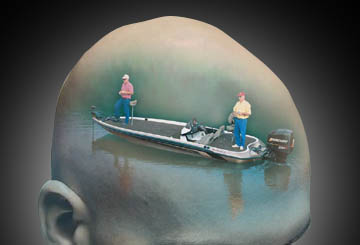Managing disappointment: Winning when you can’t win

The 2010 tournament season is well under way, and the standings in your circuit probably look like the pattern found in most competitive venues. Several perennially good anglers are near the top of the AOY race, and with them are a few new names. Back in the pack are guys who do OK, but who are not typically standouts. Next to them in the standings, however, are a few good sticks having tough years.
While the names change year to year, this trend is pretty consistent. If you have kept your own tournament records (you should!), or if you review the results of tournament circuits on the Internet, you’ll see this pattern. Check the 2010 FLW Tour for a great illustration. In the top 20 are veterans like Ron Shuffield, Andy Morgan, George Cochran, Tom Mann Jr. and Clark Wendlandt. Newcomers at the top include a couple West Coast guys, Rusty Salewske and Justin Kerr. Struggling this year are anglers named Nixon, Hibdon and Morehead.
So, right now is the right time to check in with yourself to see how your performance to date stacks up against your goals for the year. If you are on track or ahead of schedule, good for you! It would be worth spending time considering what you have done well and how circumstances have conspired to help you succeed. No matter how well you are doing, you should also critically evaluate your mistakes and made plans to eliminate those errors the rest of the way.
However, this time of year is especially critical if you have not met your 2010 expectations. Having fallen short of your goals, it’s time to figure out why. As you have read here before, the very best strategy would be to get input and suggestions from someone else. Self-analysis is notoriously inaccurate and incomplete. Most of us overestimate our strengths and minimize our weaknesses. However, it’s the things you don’t even know you are doing (or not doing) that others might help you notice and fix.
A consistently good angler I worked with did well in his early years on a large regional tournament circuit. A key part of his routine was making a specific list of locations he would visit and techniques he would use during each practice and competition day. As his familiarity with the waters being fished grew, this angler stopped creating meticulous lists. Concurrently, and surprisingly to him, his average performance began to slip in spite of substantially greater knowledge of each lake and reservoir being fished. It wasn’t until a friendly fellow fisherman pointed out that he had stopped making comprehensive lists that this angler realized the error of his ways. Once he resurrected his routine of creating specific, written plans, his tournament performance began to improve.
Performance psychology concepts can be extremely helpful if your season represents a disaster in progress. Here’s how. To begin with, remind yourself that you are a serious competitive angler. Unless this is your last season and you have decided to either retire or take up golf, you’ll continue to focus on being the best angler you can be, winning as many tournaments as possible, moving to the next level, and so on. There’s no better time to renew your commitment to being a top-flight angler than right now when you are at the bottom. Think of it this way; from where you are in the standings, there’s really only one way to go: Up!
Obviously it’s no problem to be upbeat, optimistic and confident when you’re winning. It’s when you’re behind by two fish or five points or three runs late in the game that you really need the mental toughness, resilience and focused concentration necessary to close it out.
Since your season stinks, change your goals from winning AOY and instead decide to be courageous and close strongly. No matter how bad last week or last month or this year has been, the next cast, the next five minutes, the next hour or the next tournament are brand-new opportunities for you to perform your best. This is most assuredly not the time to get lazy, act like you don’t care or otherwise cultivate defeatist behaviors.
A great example of this happened in the recent 2010 NBA finals. After the Lakers went down two games to three against the Celtics, some media moron asked Kobe Bryant about motivating his teammates for the next game. Kobe’s response was, “It’s the NBA finals. You just man up and play.” Simple, yet true.
So think about it. Are you a quitter? Well, then don’t act like one. Are you a wimp when things get tough, or are you gonna man up and play? Refocus, recommit and get after it, or roll over?
P. S. Get some help! You are not as good as Kobe or as smart; remember, Kobe listens to his coach!

————————————————–
Jay T. McNamara, Ph.D., L.P., also known as Dr. Fish, recently finished his book “The Psychology of Exceptional Fishing.” You can order it by contacting Jay via e-mail at this address: [email protected].
————————————————–
Jay T. McNamara, Ph.D., L.P., is a psychologist, who is also an avid bass and walleye angler. With more than 27 years of professional experience complemented by participation in competitive fishing at local and national levels, he is uniquely qualified to illustrate how performance psychology principles apply to tournament fishing.